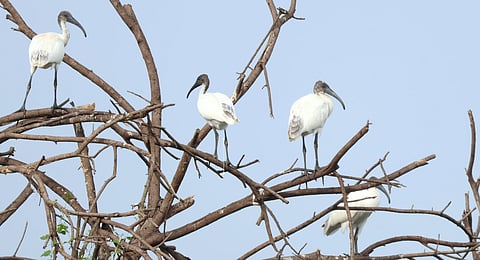

SIVAGANGA: The Vettangudi Bird Sanctuary has witnessed a multi-fold increase in the number of winged visitors this year. While only 800 migratory birds had turned up at the sanctuary in 2023, the number has gone up to 3,500 to 4,000 this year, said the Sivaganga district forest officials on Friday.
Vettangudi Bird Sanctuary, spanning across 36 hectares along the Madurai-Karaikudi Highway in Kollukudipatti and Vettangudipatti villages, is annually visited by over 20 species of birds, including Egret, Indian Spot Bill Duck, Darter, Asian Openbill Stork, Black Headed Ibis coming from different parts of the world, including from Australia, Europe and Southeast Asia. Of them, Asian Openbill Stork and Black Headed Ibis arrive at the sanctuary, particularly for roosting and breeding purposes.
According to the villagers, the early arrival of migratory birds is a good omen as the avian species have a strong sense of the intensity of the year's monsoon. If the birds nest in low-lying areas, it indicates less amount of rainfall. Whereas, if they nest in higher terrains, there would be heavy rain, said the villagers.
It may be noted that the villagers had stopped the bursting of crackers during the Deepavali season (September-October) to avoid any disturbance to the bird arrival, for the last three decades.Forest officials said that they have taken measures to mitigate natural threats for the bird species and shifted as many as 32 monkeys and two pythons from the sanctuary this year, in a bid to prevent them from eating the birds' eggs.
The locality is filled with Nattu Karuvelam trees that are maintained for the birds, and the department has also been removing unwanted trees and bushes from the venue. Moreover, the forest department has been maintaining fish fingerlings in three water bodies to ensure food for the birds. Anti-poacher watchers have been tasked to protect the birds from human attacks, and special teams have also been set up to monitor and ensure that the birds are not affected by flu, officials said.
"As a new step, the forest department in association with Salim Ali Centre for Ornithology and Natural History in Coimbatore conducted a study on sound waves affecting the birds, as the sanctuary is located along a highway. However, as per the preliminary report of the study, nothing alarming was found," added the officials.